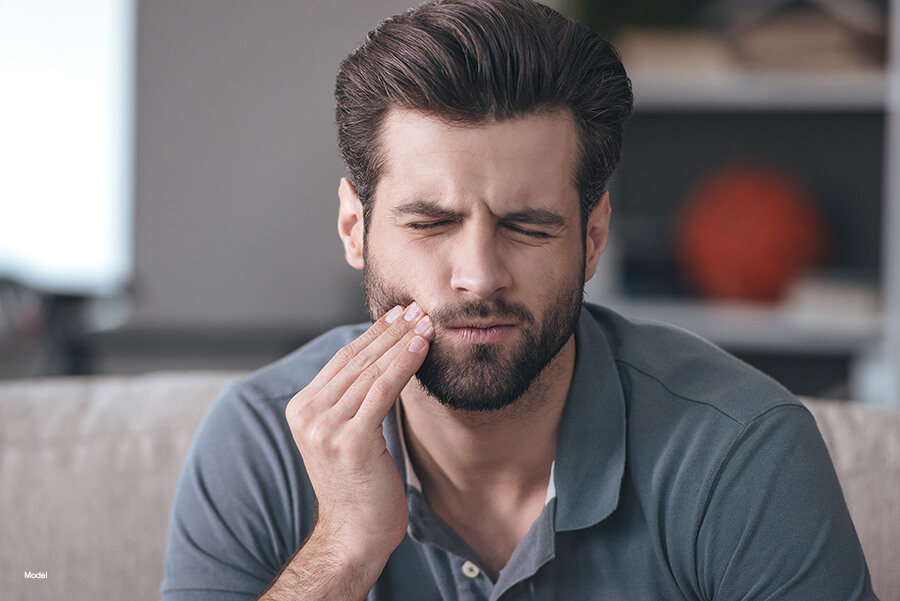Posted August 24, 2023 in Emergency Dental Care
4-Minute Read:
Tooth pain, irritated gums, and overall oral discomfort are never fun. When this pain and discomfort persists, it might be a dental emergency.

When you experience a dental emergency, it can be hard to know what to do. While the first step should always be to call your dentist for an appointment, there are some things you can do at home to manage pain and prevent further issues.
What Is a Dental Emergency?
Some people feel tooth pain and immediately call their dentists.
Others try to wait it out until the pain becomes unbearable! Don’t be that person. You should always call your dentist as soon as you experience pain in your tooth or gums, as it usually signals that something is wrong.
Signs of a dental emergency include:
- Severe toothache
- A badly cracked tooth
- A loose or knocked-out tooth
- Dental abscess or facial swelling
- Lost or broken dental restorative (crown, veneer, bridge, or implant)
These issues can be considered dental emergencies; you should call your dental office immediately.
Gentle Care Dentistry understands how important it is to get care as soon as possible during a dental emergency, so we reserve time throughout the day for patients who need urgent appointments.
If your dental emergency happens outside of regular hours, or your appointment is not for a day or two, you can do a few things at home to ease the pain and keep the problem from worsening.
Dental Emergency Care at Home
Once you have made an appointment for emergency dental care, the next step is not to panic. Our office handles all emergency dentistry occurrences, often without needing a referral to a specialist. You will get the care you need.
You can help ease pain and protect your injured or damaged teeth and gums while you wait for your appointment.
For Urgent Toothaches
DO
- Keep your head elevated and use ice packs to reduce swelling
- Use extra pillows when sleeping
- Brush your teeth normally, but be gentle
- Be careful eating and drinking; stick with soft or easy-to-chew foods
DON’T
- Chew on ice
- Use your teeth as tools
- Smoke
- Use sharp instruments to remove something stuck between your teeth
You can use over-the-counter pain relievers like aspirin or ibuprofen to reduce pain. You may also use an oral pain gel, typically sold in any drugstore, to alleviate pain and minimize swelling. Saltwater is also a good home remedy, as it kills bacteria and reduces swelling.
What Causes Severe Toothaches?
Preventative measures, including proper oral hygiene and regular dental exams, are the best way to avoid dental emergencies. Still, accidents happen.
Understanding the common causes of severe toothaches and dental emergencies is important to prevent them from happening.
Tooth Decay
Plaque and bacteria build-up on your teeth can damage the enamel. When the enamel breaks down, holes or cavities form, which exposes the nerves and causes sensitivity or severe pain.
Abscesses
An abscess is an infection in the tooth’s nerve caused by decay and trauma. An abscess can be extremely painful and is usually treated by root canal therapy or extraction.
They are best treated early on, so if you feel the warning signs or have experienced trauma to the teeth or face, call your dentist.
Gum Disease
Gingivitis can result if bacteria and plaque are left untreated under the gums. This can worsen over time, eventually causing tooth pain, damage to the jaw bone, and tooth loss.
Trauma
Injuries to the face or mouth can cause cracked, chipped, or lost teeth. Any of these issues can result in toothaches. If you have experienced trauma to the mouth and are experiencing pain as a result, you should schedule an appointment with your dentist.
Don’t Wait – Call Your Dental Emergency Experts ASAP
Entrusting your dental emergency care to an experienced team is essential in preventing future issues. If you have a dental emergency, call Gentle Care Dental as soon as possible.
If you have made your appointment and are waiting it out, follow the above steps to ensure you do not cause additional damage. An untreated dental emergency can result in worse pain and even tooth loss or damage to your jawbone.
The team at Gentle Care Dentistry is happy to answer any questions and always take dental emergencies seriously to get you the care you need when needed.
Interested in Dental Emergency Care in Las Cruces?
If you’d like to learn more about dental emergency services or schedule an appointment, call Gentle Care Dentistry at (575) 524-3722 today.